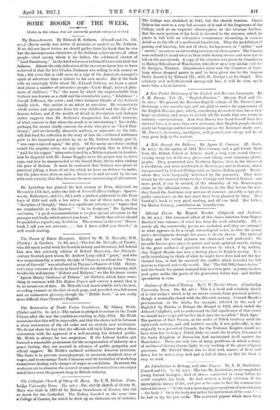Outlines of Mediaeval history. By C. W. Previt5 Orton. (Cambridge
University Press. 10s. ed. net.)—This is a lucid and scholarly sketch of a vast subject which is by no means remote from practical politics, though it nominally closed with the fifteenth century. General Maude's proclamation to the Arabs, for example, referred to tho sack of Baghdad by Melaka or Hulagu the Mongol in 1258, which ended the Abbasid Caliphate, and to understand the full significance of that event we should have to go still further back into the so-called " Dark Ages." The position of East Prussia, in the midst of Polish territory until the eighteenth century, and still isolated racially if not politically, is duo originally to a• perverted Crusade, for the Teutonic Knights would not have been free to help a Polish Duke to crush the heathen Prussians if the Latin Kingdom of Jerusalem had maintained itself against the Mamelukes. These are only two of many problems on which a study of mediaeval history throws light, to say nothing of the great religious questions. Mr. Previte Orton has to deal with masses of facts and dates, but ho writes very well and is full of ideas, so that his book is easy to read.


























 Previous page
Previous page